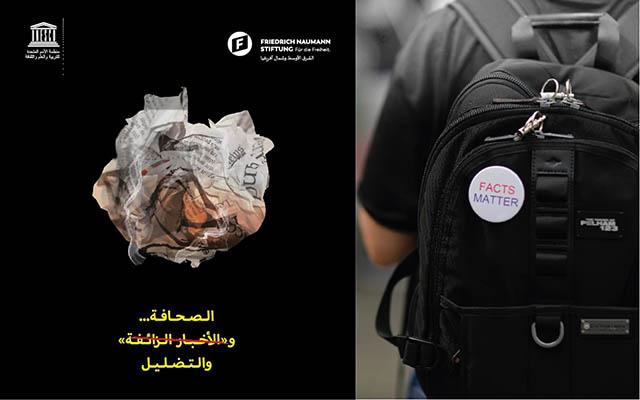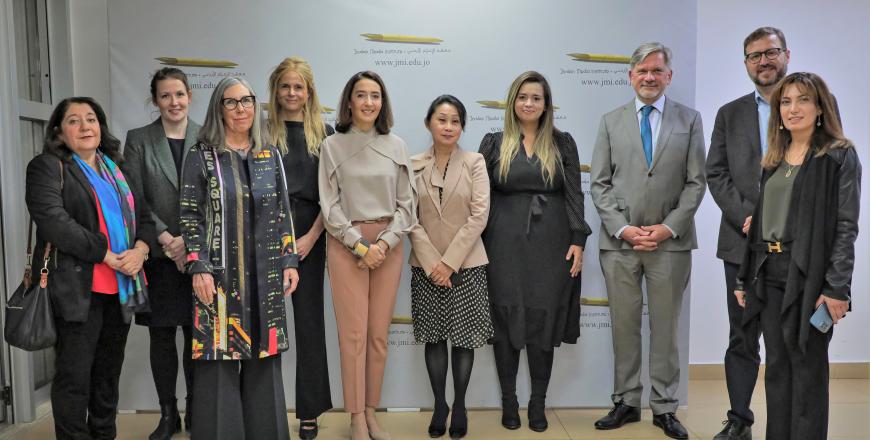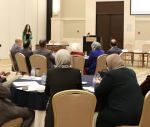You are here
UNESCO marks World Press Freedom Day by drawing focus to countering disinformation
By JT - May 03,2020 - Last updated at May 03,2020

Photo courtesy of UNESCO and the Friedrich Naumann Foundation
AMMAN — On World Press Freedom Day, which falls on May 3, UNESCO in Jordan has announced that it is fighting back against disinformation and misinformation in cooperation with the Friedrich Naumann Foundation for Freedom, according to a joint press statement.
Ever since the outbreak of COVID-19, journalists have been working around the clock to provide readers with comprehensive and up-to-date reporting on the global pandemic. Much of this coverage has focused on the reality of the crisis — what is happening, what can be expected and new guidelines issued by governments, noted the statement, which was shared with The Jordan Times on Sunday.
“No crisis can be resolved without accurate and reliable information. At all levels, from governments to individuals, the decisions we make can be a matter of life and death and must be based on facts and science,” the statement read.
At the core of UNESCO's mandate lies the freedom of the press and the freedom of expression, which is celebrated annually on May 3. UNESCO believes that these freedoms allow for mutual understanding to build sustainable peace.
“It is a date to encourage and develop initiatives in favour of press freedom and to assess the state of press freedom worldwide,” according to the statement
In the spirit of World Press Freedom Day, UNESCO and the Friedrich Naumann Foundation for Freedom (FNF) are officially launching the Arabic version of the “Journalism, 'Fake News' and Disinformation: A Handbook for Journalism Education and Training” publication, providing a powerful tool to media in the battle to confront disinformation, the statement said.
The publication draws on insights and advice from global experts and seeks to equip journalists to tackle “information disorder”. Seven chapters explore the very nature of journalism, with modules focused on why trust matters; thinking critically about how digital technology and social platforms are conduits of information disorder; fighting back against disinformation and misinformation through media and information literacy; fact-checking 101; social media verification and combatting online abuse.
“Unchecked and even untrue facts and news are often inadvertently spread by citizens; the mutation of that news into misinformation has been as contagious as coronavirus,” said UNESCO Representative to Jordan Costanza Farina.
“The Arabic version of this publication comes at a critical moment for all those who practice or teach journalism in the Arab region,” Farina added in the statement.
Given its structure, the handbook is particularly useful for journalism educators, media professionals and editors and all those interested in how information is shared and used.
“Emphasising that calling out disinformation is a critical mission, the handbook is both a guide and a call to action,” the statement read.
“In light of the recent developments in the world on the issue of COVID-19, we had to learn that knowledge is paramount. For an educational institute like FNF, this is the essence of our work. In times when knowledge can decide the fate of life, in times when personal freedoms are infringed for the ‘greater good’,” said Dirk Kunze, regional director of FNF MENA, in the statement.
He added: “We need a strong and intellectually well equipped ‘fourth power’ to keep an open eye. This project, among others in the MENA region and in Germany, is part of FNF’s plan to provide practical solutions to counter disinformation during the current global crisis and beyond.”
The Arabic version of the handbook has been produced in partnership with Friedrich Naumann Foundation for Freedom in MENA (FNF MENA). The UNESCO Amman Office is collaborating with Al Rai Media Training Centre and FNF MENA to host an online training and a series of webinars to mark the launch of the Arabic version of the handbook.
The first webinar was scheduled to coincide with World Press Freedom Day, with experts examining national trends in COVID-19 disinformation for a target audience of primarily journalists, the statement said.
The handbook can be accessed online at: https://en.unesco.org/news/journalism-fake-news-and-disinformation-handbook
Related Articles
AMMAN — Al Rai Centre for Media Training, in partnership with UNESCO Amman and the Friedrich Naumann Foundation for Freedom, is organising m
AMMAN — The German educational institute Friedrich Naumann Foundation for Freedom in Middle East & North Africa (FNF MENA) has opened a
AMMAN - With support from UNESCO and UNHCR, the Arabic version of the “UNESCO Handbook for Journalism Educators: Reporting on Migrants and R



















